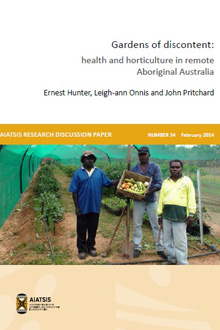Gardens of discontent: health and horticulture in remote Aboriginal Australia
In his 2007 report, the Aboriginal and Torres Strait Islander Social Justice Commissioner framed a human rights based approach to addressing persistent health inequalities between Indigenous and other Australians. While the focus of the report relates to services, the social determinants of health status are emphasised, and it is noted that ‘poor infant diet is associated with poverty and chronic disease in later life’ (Aboriginal and Torres Strait Islander Social Justice Commissioner 2007: 15). For Indigenous Australians there has been a shift in vulnerability over the past four decades — in a sense, an accelerated and offtrack ‘epidemiological transition’ (Omran 1971) — from an excess burden of mortality and morbidity from communicable diseases and conditions that reflected nutritional insufficiency to high levels of behaviourally mediated chronic diseases, prominently including those that result from smoking and poor nutrition.
